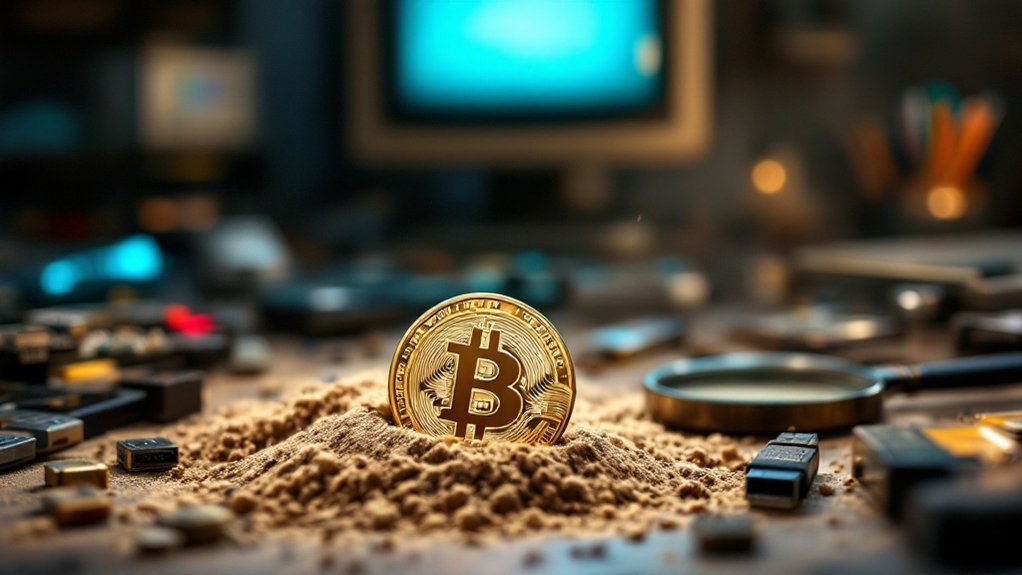Lost bitcoins often lurk in predictable places: dusty hard drives, forgotten USB sticks, and ancient email accounts. Digital archeologists dig through old computers searching for the elusive wallet.dat file or precious seed phrases scribbled in notebooks. Recovery tools like Recuva can help resurrect deleted wallet files, while blockchain explorers track digital breadcrumbs across the crypto wilderness. Exchange accounts might harbor forgotten treasures too. The quest for lost crypto requires both technical skill and detective work to access these digital vaults.

Where did those precious bitcoins disappear to? It's a question that haunts countless crypto enthusiasts who've misplaced their digital fortune. Sometimes they're hiding in plain sight – on old computers, dusty hard drives, or forgotten USB sticks. The hunt begins with a thorough search of every digital nook and cranny, looking for that elusive wallet.dat file that could hold the key to crypto riches.
Lost bitcoins lurk in digital shadows, waiting on forgotten drives and dormant computers for their owners to rediscover them.
The digital archaeology doesn't stop there. Those who've lost their bitcoins often find themselves diving into old email accounts, searching through ancient browser histories, and scrutinizing every cryptocurrency-related website they might have visited. It's amazing how many people forget they once stashed their recovery phrases in a random Gmail draft from 2013. Private key validation through expert services can significantly increase recovery success rates.
Professional wallet recovery services exist for those willing to pay up. These crypto detectives use fancy cryptographic techniques to access lost wallets – but success isn't guaranteed, and their fees can make your eyes water. Better verify their legitimacy first, unless giving away money to strangers is your thing. Having a hardware wallet backup could have prevented many of these costly recovery attempts.
The holy grail of recovery is finding that seed phrase – those 12 or 24 magical words that open everything. Get them in the right order, plug them into a compatible wallet, and presto! Your long-lost crypto fortune springs back to life. Blockchain explorers like Blockchain.com can help verify if your recovered wallet contains the missing funds.
Data recovery tools like Recuva and TestDisk can help dig up deleted wallet files, though results vary wildly.
Paper trails matter too. Old notebooks, documents, even photographs might hold the key. Some people actually photographed their seed phrases – talk about living dangerously.
Don't forget about those ancient exchange accounts either. Login credentials gathering digital dust might lead to forgotten treasures.
For the truly desperate, blockchain explorers offer a way to track known wallet addresses and transaction histories. It's like following digital breadcrumbs through the crypto wilderness.
Sometimes the biggest discoveries come from the most obvious places – that old laptop in the garage, or the notebook stuffed in a drawer. The bitcoins are out there somewhere, waiting to be found.
Frequently Asked Questions
What Happens if Someone Else Finds My Lost Bitcoin Wallet First?
If someone finds a lost Bitcoin wallet, they're legally required to return it to the rightful owner. Period.
But let's be real – crypto theft happens. The finder could try to access and transfer the funds, which is straight-up illegal. Think fines and jail time.
The blockchain's permanent record means evidence sticks around forever. Plus, hardware wallets are nearly impossible to crack anyway.
Basically, finders aren't keepers in crypto-land.
Can I Track My Stolen Bitcoin Through Blockchain Transactions?
Yes, Bitcoin transactions can be tracked through blockchain explorers – every transfer leaves a permanent public record.
Enter the transaction ID on sites like Blockchain.com or BTCscan.org to see the complete trail.
But here's the catch: tracking doesn't equal recovery. Thieves use mixers and cross-chain transfers to obscure trails.
Even if you spot your coins, getting them back requires law enforcement involvement and legal proceedings.
No magic "undo" button here.
Are There Professional Bitcoin Recovery Services I Can Trust?
Several legitimate Bitcoin recovery services exist – but buyer beware.
Wallet Recovery Services, Puran Crypto Recovery, and KeychainX have established track records and success-based fee models. No upfront payments required.
Red flags? Services promising 100% recovery rates or demanding money first.
Pro tip: Look for companies using air-gapped systems, providing legal agreements, and maintaining transparent communication. The good ones only get paid if they actually recover your crypto.
Do Hardware Wallets Make It Impossible to Lose Bitcoin?
Hardware wallets are secure – but not foolproof.
While they protect against hacks and malware, they can't prevent human error.
Lost recovery phrases? Bitcoin gone forever.
Damaged device? No problem if you have the backup phrase.
But lose both? Those coins are joining the billions already lost to the crypto void.
Even the fanciest hardware wallet can't save users from themselves.
Simple fact.
What Percentage of All Bitcoin Is Permanently Lost Forever?
Research suggests around 20% of all Bitcoin is gone forever – we're talking roughly 3-4 million coins just… poof!
Various studies, including Chainalysis's 2020 report, put the figure between 14-19% of the total supply.
Early Bitcoin folks weren't exactly careful with their digital gold.
Lost passwords, trashed hard drives, and "whoops, I sent it to the wrong address" moments have effectively turned billions of dollars worth of Bitcoin into digital dust.





